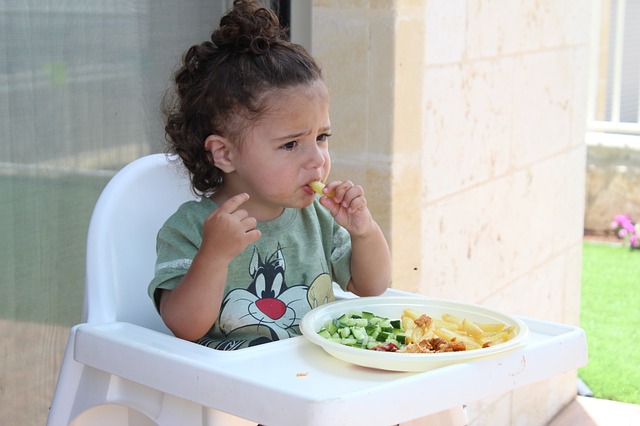
Do You Have Trouble Feeding Your Child?
Kids are the god’s greatest gift a parent can ever get. Every parent wants their children to grow healthy and strong. During the initial years of life, it is important for a parent to look after the nutritional needs of their children in order to ensure proper growth and also develop a lifelong habit of healthy eating. Good habits inculcated at a young age, remains for life. But for most parents this is their biggest concern – How their children can eat healthy nutritious food and still enjoy them?
This is a question I often come across. People have this belief that healthy foods are always boring. Especially for children, parents literally battle to feed them a nutritious meal. In order to avoid this trouble of feeding your child, you may overlook their nutritional needs and allow them to have whatever they like. This habit increases their chances of getting malnourished at a young age leading to other health problems in the adult age. (Malnourishment doesn’t imply only for underweight kids. Even obese children are called malnourished.)
A child’s nutritional requirements and its food choices are equally important while planning a diet plan.
After 6 months, when a child can be given almost everything in boiled and mashed form. But as they grow their growth rate changes, changing their nutritional requirements and also their food preferences. Here comes the main hurdle: Trouble feeding your child. Since their energy needs are more but their stomach is small, a proper balanced diet needs to be planned splitting them into 5-6 small meals a day.
A balanced diet can be planned including the following food groups
- Cereals, roots and lentils: They provide sufficient energy and required amount of proteins needed for their growth.
- Milk and milk products: They provide more or less all the essential nutrients required for a healthy growth of the body and strong bones. They are a rich source of Vitamin B12, which is produced only by animals.
- Vegetables and fruits: Children should be given a generous helping of all vegetables (both green and others). A variety of fruits can be added as snack. These boost the body to develop immunity.
- Nuts: They are not only tasty snack but very nutritious. Almost all nuts contain good amount of proteins and good fats.
- Fats and oils: Unlike adults, children can be given fats in all forms such as butter, ghee, cheese, whole milk, dessert. Fats are rich source of instant energy and fat soluble vitamins A, D, E, K.
- Honey and jaggery: These are healthier alternative than sugar. White sugar is just a source of calories but honey and jaggery provide few nutrients along with calories. The latter also add colour and flavour to the foods.
- Fish, eggs and meat: For non vegetarians, these foods not only provide energy and proteins but also other essential nutrients. Vitamin B12 deficiency doesn’t happen if these foods are consumed regularly. (For vegetarians daily consumption of milk and its products are sufficient to meet Vitamin B12 requirements.)
Dos and don’ts while feeding a child
- Give a variety in recipes. Children get bored easily if they are fed monotonous food. To attract them and make them enjoy food, change the recipes.
- Engage your kid to help you in kitchen. Give them little dough or few leaves to play with. Make sure they don’t use knives. Children will eat what they feel they have prepared. You will not have any trouble feeding your child.
- Make sweets with different nuts, jaggery and ghee. Give them as snack or whenever they demand for candies.
- Fresh fruit juices and milk shakes are far healthier than instant beverages or carbonated drinks.
- Use ingredients disliked by your children in a different way. Such as papaya and gourds can be used with dough to prepare paranthas or with milk to prepare a dessert. Greens can be given as cutlets.
- Oral hygiene is very important. Make them brush before going to bed. Don’t give them anything sweet on bed.
- Make them to eat with their hands. In fact whole family should sit together for meal and encourage their children to eat with own hands.
- Never let them watch television while eating.
- Do not force your children to eat. Let them enjoy while eating. If they are hungry they will ask themselves.
- Don’t put too much food on their plate. Let them ask for extra serving if they need any.
- Make them play with real fruits and vegetables while teaching them at home.
- Do not show your disliking towards any food in front of your kid. They might do the same. Set a good example in front of your child. Show them how much you enjoy the foods they dislike.
- Do not argue or complain about anything in front of kids.
- Instead of indoor games, encourage your children to indulge in outdoor games. Allot them 60 minutes of the whole day for playing outside. Take the, for picnics and play with them.
- If their appetite is low or weight is drastically affected, consult a paediatric physician.
- Being a parent is not easy and no one can think better about their bright future than their parents themselves. A little monitoring and extra care can help a lot to build your child into a healthy and happy human being.
(Despite of the above suggestions if your child is still malnourished, consult a dietician to get a proper meal plan. Click on www.dietvita.com)




